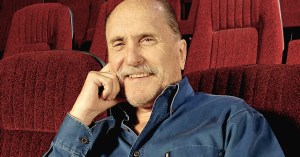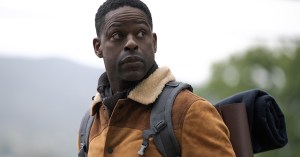RT-UK Exclusive: Matt Damon Interview
We visit the set of The Bourne Ultimatum and chat to Jason Bourne himself.
In case you haven’t noticed, The Bourne Ultimatum – quite possibly the best movie of the summer, and a film that would drive lesser critics to dust off the old ‘rollercoaster ride’ cliché – opens in cinemas today. It’s utterly brilliant. Go see it. We have – but we didn’t stop there. We also sat down a few months ago on set with the movie’s director, British director (and all-round smartest guy in movies) Paul Greengrass and Jason Bourne himself, Matt Damon, to talk about answers, ultimatums and going home.
 RT-UK: How’s the shoot going so far? You’ve been to Tangier, so you’ve got the suntan out of the way.
RT-UK: How’s the shoot going so far? You’ve been to Tangier, so you’ve got the suntan out of the way.
Matt Damon: For these? Yeah, but there’s always a kind of taste of a warmer location. We had India last time when it was starting out and this time we have Tangiers set in the middle. So the first one we ended in Greece in that little scooter shack. We get to see the world! They treat us with one warm location per movie and then it’s off to Moscow in the winter! (laughs)
Yeah, that’s one of the major conceits of the movie. The scene – I’m sure they told you this, I hope they told you this and I’m not divulging a huge secret – but the scene at the end of Supremacy, on the phone to Joan Allen, is actually kind of starting our third act. So the first two acts take place directly after the Moscow scene in the Bourne Supremacy and then it kind of takes off from there into that scene with Joan, which will have new meaning this time around. And then we go into the…
RT-UK: That’s pretty bold. Do you think people will realise what’s going on?
MD: Well, people are going to have to know that anyway when they see the movie otherwise they’ll be like ‘what the fuck? I thought this scene was in the last movie!’
RT-UK: You weren’t signed on to do a third Bourne. So why come back?
MD: Well, it’s very different from any character. I usually play characters that are a lot different than me. I mean, I’m never in a fight in a movie and if I’m in them, I’m usually losing. So that’s different and I like the guy. He’s an outsider and he’s against this system that he feels is corrupt and I don’t know, there’s a lot to relate to about him.

RT-UK: And now you know the character intimately, does that help when it comes to working out the story?
MD: Yeah, but I think most actors are like that, particularly if you’ve played a role before. We’ve put him in all these situations and we know if it’s not working. If I start saying too much, then it’s generally not working. We went through the whole second act of the movie last time and Bourne didn’t really talk at all for probably 45 minutes to an hour of that movie. So contriving people for him to talk to is a mistake, it just doesn’t feel right, it feels like he should be on his own. The difficulty lies in trying to tell a story. The way you’d normally tell a story is through the characters talking to one another!
RT-UK: Is that a problem, though, having a hero who barely speaks?
MD: Yeah, it’s definitely challenging to try to relate plot that way. And that’s why the B side of our story, normally, has a lot of Johnny Explainer scenes and on the B side because there are computers all around them and they’re going ‘what’s he doing?’ and it’s ‘I think he’s doing this!’ or ‘Well, I think he’s doing that!’ to kinda help because on this side of the story we don’t tend to fill in the blanks very well.

It’s a bigger challenge for Paul because I can walk around and think about whatever I want to think about but it’s not going to make any sense unless he puts me in some kind of context that explains what I’m doing. An actor can sit there and think about his dog dying but if you cut to a shot of a roast turkey, people are going to think he’s hungry so it’s really up to the director to contextualise what the actor’s doing or else I’m just the guy who’s walking around, brooding.
RT-UK: What special skills have you developed thanks to Bourne?
MD: I kept up with the boxing all the way from the first one. That’s the main thing that I do. I don’t think there’s a new skill or anything that I had to pick up for this. This is much more about trying to get the details right, and that kinda takes up all of our time. We’re really invested in this series of movies, we really love ‘em. Our main goal is to try and make sure that all those little details are right.
MD: In general, with these movies it’s really easy to fall into what’s been done before. Your first instincts are usually wrong because they’re usually being fuelled by other movies that have come out that are similar. So it’s how do we make it that all the little details, the way he reacts to situations… I always liked the first movie, with the scene in the embassy where they’re all closing in on him and he gets a map and a radio and he walks up the stairs and very calmly walks out and heads towards the roof. Well, in normal American cinema the guy would get a gun and run out the front door and start blowing everybody away. It’s really the opposite so you try to think, ‘what would be the smart thing to do here?’ He’s outnumbered and so the smartest thing would be for him not to panic, that’s the first thing and to get into their communications systems so that he knows what they’re doing and to understand where he is, he’d get a map and navigate his way out, and he finds this fire escape and he climbs down the wall and he walks away. Those scenes, when Doug Liman came up with that, I was like ‘I dunno if people are going to like this. It’s anti-climactic. He doesn’t take on everybody’ but we thought it was kinda cool and then when the movie came out people really responded to that kind of action where there’s a throughline to it and what the characters are doing are making sense. You don’t have any characters who have stormtrooper syndrome who are shooting and missing constantly, and it feels that there’s danger and usually things that happen to Bourne come at a price. For instance, that scene in Berlin [on Supremacy], that night of jumping off the bridge, he gets pretty messed up in that sequence, he runs and runs and runs, he makes it to the train and he’s checked the schedule and the doors don’t close, so it’s playing on that movie convention where you run and run for a train and the doors don’t close and then he goes running out into the open because he sees this boat and he jumps off the thing onto the boat and he shreds the ligaments in his leg. It’s the only way he can get away but it comes at a price. He’s realised that he can get back up onto the bridge and still make his train if he hustles and throws everybody off. It’s a thought-out sequence that’s kinda unfolding in real time. That’s the fun of it – the audience asks ‘how would I get out of it?’ and then Bourne figures a way out of it.

RT-UK: Paul’s shooting style is an enormous asset for this kind of movie.
MD: It’s just different from the way that other movies do it. The camera never anticipates what’s going to happen, it always catches up afterwards and that’s because Paul’s from documentaries. He says ‘look, when a bomb goes off in a plaza, you never catch the explosion or the person who planted it, you always only see the aftermath and suddenly there are people on the ground, that’s what’s real’. So if Bourne looks in a certain direction, then the camera goes in that direction. There’s something about if the camera’s there and then somebody bursts in through the door, you feel safe. You feel that whoever’s telling me the story knows what’s going to happen next, so I’m just out in front of the story a little bit and I’m watching, whereas if things happen and then the camera reacts to them, then you become a bit paranoid with the characters, you don’t really know where you’re going.
It’s a subtle but really effective message to the subconscious of the viewer as they go ‘I’m not in control here, and the person who’s telling me the story isn’t in control and we don’t know where it’s going to go. Anything can happen. Say, the car chase in Moscow in the last one, the whole idea was a handheld car chase inside the car which had never been done before, so Dan Bradley [second unit director] was doing these hits. You could see the incredible punishment and the cars would come out of nowhere and hit him, as they would. And so it gets your nerves up.
RT-UK: Are you done with Bourne? Would you come back for a fourth go?
MD: (laughs) If Paul does it, if Paul does it. But it’s more, I always say see how this one goes. I said that last time and that one went really well, we were really happy with it. And we’re doing it again because we all came back together to do it again and we all do love these characters and we feel like we know them and we know how to make these movies and make them exciting, and worth the ticket price. But I don’t want to look any more ahead than this one.

RT-UK: You and Paul have a great rapport. Would you have made this movie if Paul hadn’t come back?
MD: No, I wouldn’t have made it as readily if Paul hadn’t been involved. But if another great director had wanted to do it, if Paul was doing another movie and some great director stepped in and said ‘I want to do it’, then I could see a world in which I would do it. But the fun of it, for us, is working together again because you can accomplish a lot when you have that shorthand with somebody.
RT-UK: What did you think of United 93?
MD: I loved it. Again, it’s that kind of thing that he did with Bloody Sunday that I thought is really effective where he takes an event that everybody has an emotional connection to and shows it in a very observed and dispassionate way. It’s just really affecting and the last 45 minutes of the movie, I just thought were really hard, in the right way, in a cathartic way. It was really hard to do that and watch that but I thought it was absolutely brilliant.

RT-UK: Do you think Paul brings an independent sensibility to it? Bourne movies are not shot in a conventional manner, for example. Does the studio get nervous about the constant additional shooting?
MD: We have a great rapport with the studio because they let us do it the way we want to do it which isn’t the way that everybody else does it, and they have veered away from the more standard choice that people make, which is great. There are very well-known movie star actresses, who are much bigger movie stars than me, who wanted to be in the first movie in that role and Doug [Liman] said no, the girl would be European, he’s in Europe, he should bump into a European girl. And we were watching all these movies, and we saw Run, Lola, Run and then we went ‘my God, this girl is great!’ Doug met Franka [Potente] and said she can act in English, she speaks English really well, she’s terrific and we thought that would be a big fight with the studio and we went to them and said ‘look, this makes more sense if it’s Franka Potente and not one of these big superstar actresses’ and they were like ‘ok, you know’ and they really backed us up.
They were open to it. They trusted their director. That’s a great situation to be in because it does allow you to do things a little differently and no-one panics. But I think also these movies allow us to do those other movies. Since this one, I got to do Syriana and The Departed and now The Departed is a big hit, but at the time, well, Marty’s movies don’t usually make money, they really don’t and we’re all shocked. And we’re all really happy for him but no-one was expecting it. No-one who was in it thought, because he’s made as many movies as he’s made and generally there isn’t a huge crossover audience so the Bourne movies allow me to do these movies like that with Marty or this one with De Niro that I did, The Good Shepherd, which are very different and it allows Paul to go and make United 93 and then come back to it. They’re just really great for us because they give us incredible freedom in our careers and also incredible freedom within these projects themselves to do a movie in a way that’s fun and interesting to us. Because none of us are interested in just doing big movies the other way.





